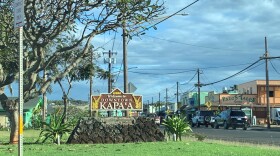Hawaiʻi's county mayors now have the authority to adjust COVID restrictions in their jurisdictions under the latest emergency order signed by the governor.
On Kauaʻi, limits for social gatherings have been raised to 40 people indoors and 100 outdoors. Any event over the limit must ensure all attendees are fully vaccinated or have proof of a negative COVID-19 test taken within 24 hours.
Event organizers will no longer have to register event information with the county. But they are still responsible for maintaining contact information of attendees.
Under new state guidelines, restaurants can operate at full capacity. The indoor mask mandate remains.
The Conversation heard from Big Island mayor Mitch Roth on Tuesday about managing the latest phase of the pandemic. Now, here's our conversation with Kauaʻi Mayor Derek Kawakami.
———
On making changes to Kauaʻi's COVID-19 guidelines
DEREK KAWAKAMI: I think, at this point in time, the governor dropping restrictions is a natural occurrence. He's starting to look at the statewide vaccination rate, he's been able to see how the state has handled the worst of the Delta variant surge, and now he is leaning more back towards a home rule with the counties and the mayors having an ability to have a say. But I don't anticipate too much change here on Kauaʻi with the governor's announcement and his new emergency rule. We're gonna continue to be mindful, especially since health experts are analyzing this new variant, but we're gonna continue to do just whatever we can to support the Department of Health and continue to support the state — and make sure that our people are safe, and that the economy is continuing to thrive.
On the 68% fully vaccinated rate, as of Wednesday, for Kauaʻi County — which is lower than Oʻahu's
I think just naturally, we're more rural in nature, you know, we're not living in such tight quarters as much of urban Oʻahu is. I think that if many of our families are living in high rises, or having to share an elevator to get up and down, to and from work, they would probably be more inclined to perhaps consider getting vaccinated, but I think our island is doing quite well. Of course, we always wish more people would get vaccinated. But we're not in a race with the other counties. I think it's very obvious and apparent at this point, that the whole world is in this situation. And the quicker we can all get together and move in the right direction, I think the sooner we'll be able to get through this. So I'm very glad that Oʻahu, in fact, I hope that Oʻahu has a vaccination rate that far outpaces the rest of the islands — because we rely so much on Oʻahu. I mean, we get worried whenever there's a hurricane that's approaching, we get worried about anything impacting Oʻahu because the neighbor island counties, we really rely on Oʻahu.
On the Omicron variant and how contagious it might be
Still too early to tell. You know, people shouldn't be to a point where thinking about this variant erodes at their mental health and their physical health as well. I would say these type of mutations occur, especially in coronaviruses. We've got some of the best scientists and health experts all looking at it to try and figure it out. So I would say that we should continue to be as safe as we possibly can. Let them figure it out and let us know what we need to do to respond, if anything. As far as the indoor masking, it makes sense. Especially, you know, when we're talking about not transmitting or getting sick. I support it.
On tourism levels on Kauaʻi and how businesses are rebounding
The amount of tourists coming in, it's like, nothing really changed in our infrastructure. I mean, to do the type of infrastructure changes to be able to handle the capacity of our visitor industry — it would take years and years of very big investments. But we are starting to see people starting to utilize alternative forms of transportation. I was just on the North Shore and I saw the North Shore Shuttle just doing their thing getting visitors to and from Keʻe. We saw their parking lot full. So that's always a good sign is when we start to see our visitors jumping on other forms of transportation. I think for businesses, they're just happy to see the increased customer count, getting their workers back to work, and just being able to continue to keep their businesses operating. I think the visitors coming into Kauaʻi is the blessing for many of our local mom-and-pops that they've been waiting for.
On how the county is collecting its new 3% hotel room tax to pay for county services
We're collecting money already. Yeah, we took the 3%. Our finance department had to work very hard to get a system in place. They created an online payment portal so that TAT taxpayers have a way to pay into the county. We're receiving payments as we speak. And it's much needed. It is amazing that our finance director was able to find a workaround to make it happen. So that is something that I'm very pleasantly surprised. We are starting to get some TAT, so at least we'll able to count on that revenue.
Normally, you know, we're getting about $15 million. So I don't know if we're going to be able to collect that. But we're just happy that we're able to collect it because, at one point, it seemed like it would be an impossible task, and we're making it happen.
This interview aired on The Conversation on Dec. 1, 2021.







